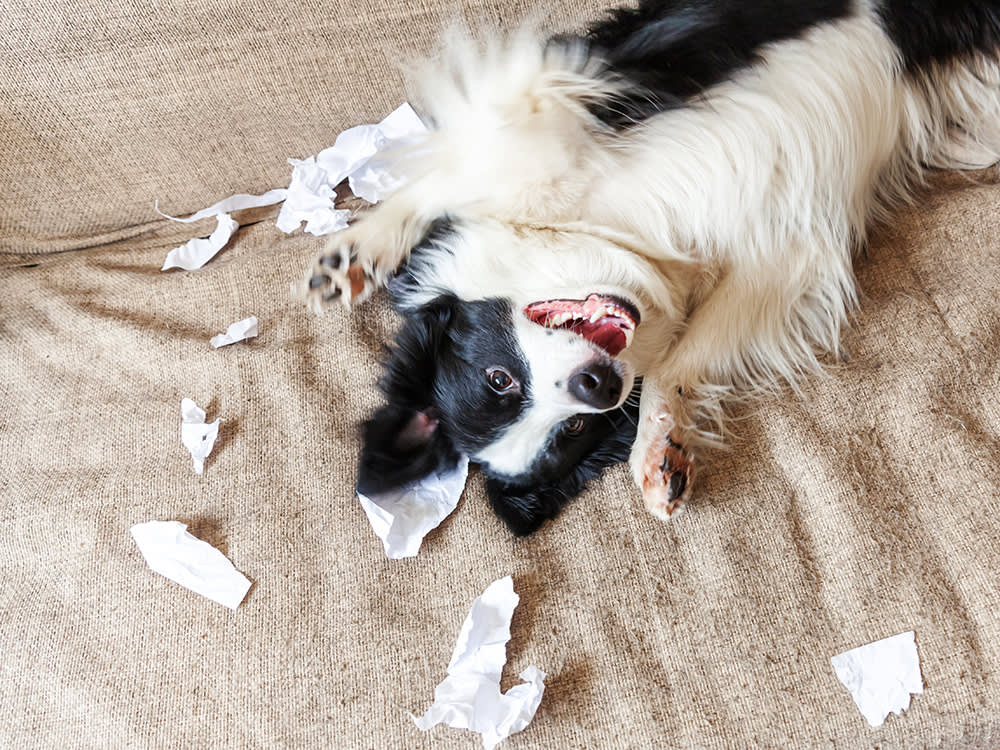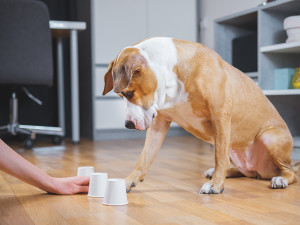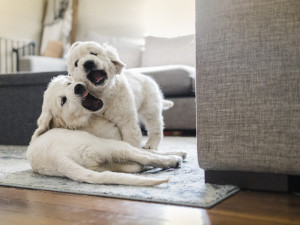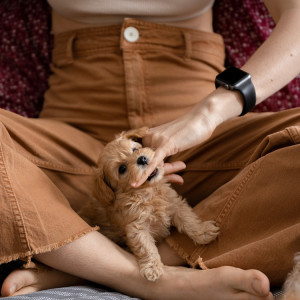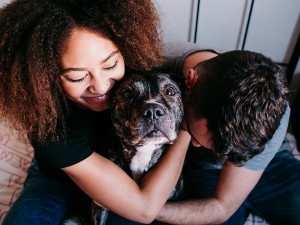New Puppy Driving You Nuts? Here’s How to Deal
The beginning of puppy parenthood can be rough, but it does get better — especially when you implement this advice.
No matter how cute your little rascal is, puppy-wrangling can be absolutely exhausting. While it's true that adopting a puppy can bring a much-needed source of joy and unconditional love into your life, it can also bring stress, anxiety, exhaustion, and frustration (often called the “puppy blues”). The cycle of cleaning up messes and constantly removing household objects from those tiny teeth can become overwhelming, particularly if you’re also working from home during this time.
It’s normal for the entire process to make you feel drained (especially when you’re running on little sleep!). Fortunately, there are ways to make it easier on both of you. Here are six super helpful strategies for coping with the stress of new pup parenthood.
1. Create an Exercise Routine
Although the ball of fur zooming around your living room each morning may seem like the Energizer Bunny, that puppy energy actually comes in short (yet invigorating) bursts. If you can give them a way to release that, they’ll likely be ready to rest afterward.
If going for a walk doesn’t fit into your day, there are plenty of other ways to exercise your puppy. Play a few rounds of fetch or engage them in chasing a toy around the living room. You can even set up a treasure hunt by hiding small treats and tossing a few across the floor to get their attention.
How much do you spend on your pet per year?
Dogs thrive in routine, so try to exercise your pup at the same times each day — even better, schedule playtime for the hours when they naturally get the zoomies.
2. Enforce Nap Time
They say dogs are our best friends, but naps may be a close second — especially when it comes to puppy parenting. Instead of waiting for your pup to seem sleepy, you can (and should!) put them down for a nap, just as you would a human child. That way, you won’t have to feel like your day is tossed around at the whims of your dog’s mood.
Just like toddlers become cranky when they’re low on sleep, puppies may act up when they’re overtired in the form of biting, chewing, barking, or whining. Despite their daily bursts of energy, they actually need a lot of downtime; it’s healthy for them to sleep more than 17 hours a day.
Dog trainer Sarah Hodgsonopens in new tab recommends that puppies younger than 18 weeks old take a two- to three-hour nap twice a day. After morning playtime and again after lunch, try putting your pup in their crate with a toy for some downtime. They may be restless at first, but if you’re consistent, they’ll settle into the routine and learn to self-soothe.
3. Provide Toys for Mental Stimulation
Any time you put your pup down for a nap, or when they’re simply hanging out with you in the house, make sure they have access to toys that provide mental stimulation — because mental exercise is just as important as physical. Toys also keep pups entertained, which means they won’t occupy themselves by nipping, digging, or barking for attention from their favorite person (yep, that’s you).
Interactive games are also an excellent way to give your pup’s brain a workout by having them solve puzzles in order to access a treat or prize. Chew toys are another good option because they’re not only mentally stimulating, but can also reduce stress and anxiety. Not to mention, when your pup is occupied with a great chew toy, it ensures they’re not mauling your favorite book or the leg of your coffee table.
4. Ask a Friend to Puppysit
There’s nothing wrong with taking a short break from your pup to refill your own cup. The great thing about puppies is that they’re a lot of fun to be around, especially for those who haven’t spent the morning scrubbing a pee stain out of a favorite rug. Many people will jump at the chance to spend quality time with an adorable puppy.
Ask a trusted friend or relative to watch your puppy for an afternoon, or even a full day. This will not only allow you to be “off the clock” from puppy duty, but can also contribute to your dog’s socialization by helping them learn to be comfortable with different people. Take some time to refresh so you can bring your best self to your puppy when they return from their play date.
5. Reward Calmness
When you catch your puppy being calm, reward them with food. Reinforcing calm behavior is a great training technique for raising a well-mannered dog.
A popular method for this is called capturing calmnessopens in new tab: Keep some training treats nearby during the day, and whenever you notice your puppy lying down calmly — quietly chewing a toy or simply relaxing — silently walk over to them and place a treat at their feet.
The first few times you provide a treat, they may get up and act excited. That’s okay, because you’ve successfully rewarded calm behavior. Simply walk away without reacting. By repeating this technique over time, you can help your pup build a positive emotional association with relaxation.
When you create a calm environment by giving your dog a routine they can count on, toys for mental stimulation, and removing stressful triggers, they’ll find it easier to relax.
6. Give Yourself a Mantra
Following training advice and sticking to a routine for exercise and downtime can make puppyhood smoother, but you’ll still have moments when you’re just plain tired of cleaning up random puddles and fending off sharp teeth.
For those times, come up with a mantra that you can repeat to yourself as a way of calming your emotions and reminding your brain that this is a temporary phase. Perhaps a phrase like, “I can do this,” or “The puppy phase shall pass,” or “This is just one moment.” The next time you’re ready to bury your face in your pillow, take a deep breath, crate your puppy for five minutes while you compose yourself, and repeat your mantra.
As you and your puppy build a bond, you’ll settle into your own shared routine and life together will get a lot easier. Soon enough, you won’t be able to imagine life without them.
